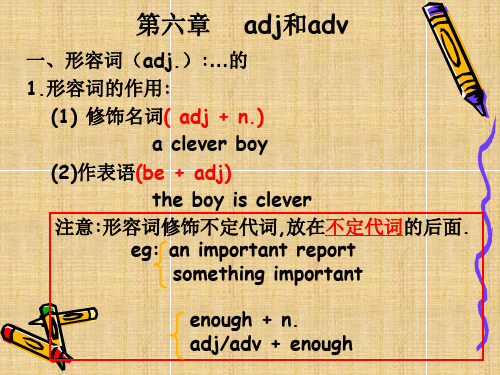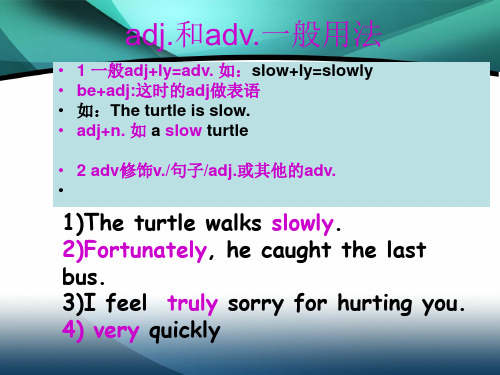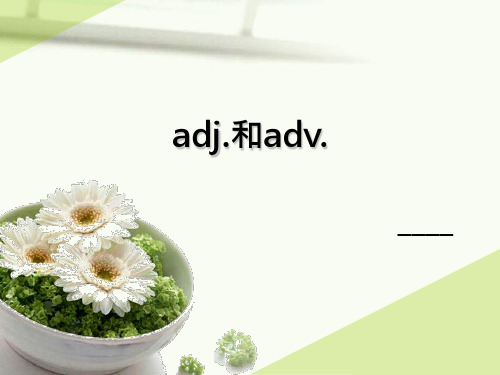adv,adj用法
- 格式:doc
- 大小:37.00 KB
- 文档页数:4



《形容词和副词》专题复习考纲概览一、形容词adj.和副词adv.区分运用1.形容词adj.(1)adj. + 名;如:Father gave me a beautiful bike. 爸爸给我一辆漂亮的自行车。
(2)系+ adj. ;如:Our classroom is big and clean. 我们的教室又大又干净。
(3)实动+ sb./sth. + adj.如:I find it interesting to learn English.我发现学习英语有趣。
2.副词adv.(1)动+ adv. 如:John spoke loudly to the old man.约翰大声地跟那位老人说话。
(2)adv. + adj./adv. 如:The tree is very tall.这棵树非常高。
(3)adv.+句子如:Luckily, nobody was hurt.幸运的是,没有人受伤。
二、形容词adj.和副词adv.的三级变化及运用大多数形容词和副词有三个等级:原级比较级最高级自主学习:请写出下列形容词或副词的比较级和最高级。
great________ ________ fast_______ _______ fine ______ _______late________ _________thin ________ ________ big_______ _______ happy________ ______ early_______ ________delicious _____________ ______________importantly________________ _________________much \many_________ ________little__________ _________good\well___________ __________学生总结形容词和副词的比较级和最高级的构成规则。



1.good,wellwell是副词,用来修饰动词,如i swim wellgood是形容词,修饰名词,如a good student另外i am well,这里的well专门用来修饰身体健康2.big,large,greatbig是使用最广的形容词,其反义词是small。
可以指范围、面积、体积、重量等方面,口语中较常用。
如:There is a big tree in front of the house. 房子前有一棵大树。
He is big enough to ride a bike. 他长大了,足可以骑自行车了。
Mr Wang works in a big factory. 王先生在一家大工厂工作。
large侧重于面积、体积、容积和数量等,比较正式,不常用来指人。
表示物时,可与big 通用。
如:Shanghai is one of the largest cities in China. 上海是中国最大的城市之一。
They have a large farm. 他们有一座大农场。
Our school is a large one. 我们的学校是一座大学校。
great 通常侧重于形容抽象化的东西,常带有主观色彩,也可以修饰人或物,用来指人时,表示“伟大的”、“杰出的”意思。
如:Our party is a great party. 我们的党是伟大的党。
China isa great country with a long history. 中国是一个具有悠久历史的伟大国家。
3.beautiful这组词均含有“美丽”、“漂亮”、“可爱”的意思。
beautiful指能不仅给人带来感官上的快乐,而且通过感官产生思想和灵魂的愉悦,在同类词中层次最She was even more beautiful than I had remembered.她比我记忆中的她更漂亮了。
good-lookingl不如handsome, pretty意思强烈,指一般的“好看”或“悦目”。
∙Tom eats cheese.∙Mary sees the cat.总体上来说英语是“中心语前置”的语言,也就是说一个短语的重心在其开头。
如:∙ran quickly (动词短语)∙to the store (介词短语)名词短语是主要的例外,为中心语后置:∙blue house (形容词 + 名词)∙Fred's cat (所有格 + 名词)所以,基本简单句的语序一般为(除去冠词和其他限定词):形容词1-主语-动词-副词-形容词2-直接宾语-形容词3-间接宾语。
语序变化一般用在疑问句(Did you go to the store?)、主动被动语态变化(The car was bought by John)及词语或语法上的强调(主题化)中。
名词英语中,名词一般描绘人物、地点、事物与抽象观点等。
名词复数形式的构成∙以s、x、z、ch、sh 结尾的名词的复数形式:当单数可数名词的词尾是s、x、z、ch、sh 时,变为复数应加- es,例如:ass — asses , glass — glasses ,inch -inches,brushbrushes,bench- benches,branch-branches,adz-adzes,quiz—quizzes。
当ch 发音为[k]时,则变复数时仅加-s:monarch—monarchs,stomach-stomachs。
∙以o 结尾的名词的复数形式:若单数名词的词尾为o,-o 前为元音字母时加-s,以-o 结尾的外来词加-s,有的加-s 或-es 均可,其中绝大部分直接加-s,这点与传统观点不同。
o加-es 的仅是有限的几个名词:antihero,bastinado,buffalo,dingo,echo,embargo,farrago,go,gusto,hero,jingo,lingo,Negro,potato,tomato,torpedo,veto。
形容词和副词(Adjective & Adverb )四、形容词 + ly 构成副词1. adj. + ly 构成副词: chief ----- chiefly2. 以–y 收尾 adj. 去y ---ily 构成副词: angr y (adj.) ------angr ily (adv.)3. 以–ble 收尾adj. ,去e 加 y 构成副词: comfort able (adj.) ----- comfort ably (adv.) possi ble (adj.) ------ possi bly (adv.)可能地4. 以–e 收尾adj.构成副词:去e 加 y : tru e --- tru ly / simpl e ---- simp ly直接+ly : polit e ---- polit ely (较少)5. + ly 的形容词:friendly / lovely / lonely / lively6. 形容词、副词同形:hard / fast / late / early / well / high /hard biscuit (硬的) fast food (快的) be early / late (早的/迟的) study hard (努力地) it runs fast (快地) get up early / late (早地/ 迟地) She doesn ’t look well , what ’s the matter? (adj. 健康的) She sings very well . (adv. 好地) She is a good singer. (adj. 好的) 五、adj.和adv.原级的用法1. 主语A+谓语+as+ adj./adv.原级+as……(主语A 和…一样): I am as tall as you.Mary studies as hard as John. 2. 主语A+谓语+ not as + adj. / adv. 原级+ asnot so + adj. / adv. 原级+ as B 主语A 不如Bless + adj. / adv. 原级+ thanam / is / are / was /were系V. 感官动词:look / smell / taste / sound/ feel / touch/ It seems delicious. / It seems that…✧ look angry (look angrily at sth.) ✧ 系v. + adj. (行为动词+ adv.)变得(四个):become/turn/get/grow保持(二个):keep = stay使得(一个):make 形容词作keep, stay 的宾语补足语特殊系动词find the man dead / leave the door open/closed / get everything ready / fall asleep/sick/ill / 六、adj.和adv. 的比较级和最高级的构成 (一)、在adj./adv.后+er/est 构成比较级和最高级 1、直接+ er/est :small-------smaller------- the smallest2、在以e 接尾的adj./adv.后+r/st :late -------later-------the latest3、以一个辅音字母接尾的重读闭音节词,双写该辅音+ er/est :big------- bigger-------the biggest4、以辅音字母+y 接尾的adj./adv.去掉y 变成i + er/est :busy-------busier-------the busiest (二)、more/the most+在adj./adv. 原形前构成比较级和最高级1、 more/the most+多音节形容词前:important more important the most important2、 -ful,-ous,-less,-tive,-able,-ed,-ing 等构成的双音节形容词,加 more, the most :famous more famous the most famous;3、-ly 的副词,加 more, the most :widely-----more widely-----the most widely bright --- brighter --- brightest clever --- cleverest --- cleverest more / the most stupid (三)、不规则变化good --- better --- the best bad --- worse --- the worst many --- more --- the most well --- better ---the best ill --- worse --- the worst much --- more --- the most little --- less --- the least far ---- farther ----- farthest / far ---- further ----- furthest七、adj.和adv.比较级和最高级的用法 (一)、比较级1. 主语+谓语+ adj., adv.比较级+than +对比成分:He is taller of the two. / He runs faster than me.of the two 用比较级:The ball is bigger of the three. (big)much, far, still, even, a little, a bit, a lot 等状语词修饰比较级:Sue studies even harder than May.2. 主语+谓语+比较级+than that /those …:The weather in Hongkong is cooler than that in Shanghai.The vegetables in the street markets are better than those in the shops.3. 主语+谓语+比较级+and+ 比较级+… (越来越…)Autumn is coming. It is getting cooler and cooler.4. the+比较级……, the +比较级……(越…就越…)The earlier you start, the sooner you will be back.5. like……better than…… = prefer…to(喜欢…更甚于…)She likes oranges better than apples. = She prefers oranges to apples. (二)、最高级1. one of + 名词(复数) + 形容词(最高级):Shanghai is one of the biggest cities in the world.2. 最高级+of/in/among+比较范围:Shanghai is the biggest city in China.3. 最高级=比较级+than any other+名词(单数)Tom is the tallest student in class. = Tom is taller than any other student in his class.= Tom is taller than other students in his class.4. the +序数词+最高级:The Century Park was the second largest in Shanghai.。
副词(adv.)修饰形容词或动词,形容词(adj.)修饰名词或者代词.副词一般以ly结尾. 副词在句中作状语,一般靠近谓语动词或者在句首或者句末.形容词靠近所修饰的名词或代词,作定语.建议你多读英语课本,有意识的分析句子的结构,找出主.谓.宾. 相信你的外语会有明显的提高的.容易混淆的形容词和副词形容词用来修饰名词;副词用来修饰动词、形容词、其他副词或整个句子。
可是,有时形容词和副词容易混淆。
例如“A fast train reached the destination fast”中的第一个“fast”是形容词,第二个就是副词。
此外,有些词既能是形容词,也能是副词,有些词义不变,另些词义不同;有些形容词加上后缀“-ly”构成的副词和原来的形容词意思相近,但有一些意义则相差甚远;更有些形容词,除自己本身能兼而充当副词之外,又可以再加上后缀“-ly”构成派生副词,若不小心,容易引起混淆。
下面分别举例说明:⑴可作形容词又可作副词,词义不同如:①a. Joelle is a pretty child.(形容词)b. Tom will be back pretty soon.(副词)②a. The old man has been ill for some time.(形容词)b. Don't speak ill of others.(副词)⑵既是形容词,也是副词,句子中的语法功能不同,但意义一样,如:③a. What a deep ocean it is !(深的)b. The boy dug deep into the ground.(深)④a. Look at the high mountain!(高的)b. Birds fly high in the sky.(高)⑶形容词可以充当副词,又可以加上后缀,构成派生副词。
在某些场合,两者相近,可以通用(如例⑤和⑥);在另一些场合里,两者意思有异,不可混为一谈(如例⑦和⑧):⑤a. Hold it tight, please!b. Hold it tightly, please!⑥a. Please read slower.b. Please read more slowly.⑦a. John came late yesterday.(迟)b. John has been working hard lately.(最近)⑧a. Jason works hard.(努力地)b. Susan hardly works.(几乎不)⑷有些形容词或副词,同时有多个意思,如:⑨a. Hard labour(苦工)b. Hard times(艰难时代)⑩a. The baby is fast asleep.(睡得熟)b. Run fast, please!(请快跑)c. Hold the rope fast!(紧握绳索)⑸同词根的派生形容词和形容词及分词间,意思虽甚接近,但容易引起混乱,如:11a. The child is sleepy.(昏昏欲睡)b. The child is still asleep.(还在睡眠中)c. Why are you looking at the sleeping child?(睡着的)12a. Diana feels lonely/ lonesome in the big house.(感到寂寞)b. Mary was alone in the office last night.(独自)13a. Irene was awake the whole night last night.(整夜未眠)b. Tom had a wakeful night last night.(整夜未眠)c. What did you do during your waking hours last night?(醒着的时刻)(a)和(b)意思相近,但(a)的awake 只能作补足语;(b)的wakeful 则没有这个局限。
(c)里的waking 现在分词和(a)及(b)的两个形容词也似同非同,不易随意取代。
在英语中,某些形容词词形同时也可作副词,但这些形容词还有加后缀-ly 副词的形式,因此这类词就有两种副词形式,它们在用法上有些可以互换,有些是有区别,下面笔者对这类词做一总结。
一般地说,可以互换的这类词,形容词词形的副词表示比较具体的概念,经常用语口语中,不太正式;后缀-ly形式的副词,表示比较抽象的概念,有引申义,并有一定感情色彩,变副词比较级时,用此类副词,如修饰动词和分词,放在它们前面。
1) cheap: often used instead of cheaply, esp. in casual conversation and with verbs like buy and sellDo you like this shirt? I bought it really cheaply.cheaply I can't sell you more cheaply.2) clean: completely, used with (1) verb forget (2) the proposition over, through (3) adv away outI ~ forget. The ball sailed ~ over the roof.The prisoner got ~ away. I am afraid I am clean out of food.cleanly: precisely in a clean manner, often used with v cut.He caught the ball ~ . The doctor cut ~ through the abdominal wall.3) clear: not touchingPlease stand clear of the gate.clearly: distinctly, obviously, similar to the meaning of clearI can't see ~ without my glasses.We ~need to think again.4) close: nearCome close, I want to tell you something.closely: carefully, with great attentionStudy this ~ it's very important.5) dead: exactly completely, used in certain expressions~ right, ~ sure, ` tired, ~ slow, ~ ahead, ~ drunk, ~ straightdeadly: fatallyHe was ~ injured in the crash.6) direct: used instead of directly in talking about journeys and timetablesThe plane goes ~ from London to Houston.7) easy: used in certain expressionsTake it easy. easy come, easy go.Easier said than done.easily I can do very easily.8) fair: used in the expression play ~, fight ~fairly: justly, honestlyYou must do it ~.9) fine: well, used in some expressionsThat suits me fine. You are doing ~.finely: elaborately (细微地)(not commonly usedHe studied it very finely.10) free: without paymentYou can't eat ~ in my restaurant.freely: without limit or restriction(限制)You can't speak ~ in front of my father.11) hard: to show degreeHe hit hard.hardly: almost not12) high it refers to high position.Don't go higher. It is dangerous.highly: it refers to an extreme degree "very much".She is ~ paid. It is ~ amusing.13) just: a moment ago I have just come here.justly: in accordance with justice or the law.You must do it justly.14) late: not on time He hates arriving late.lately: recently I haven't heard from you lately.15) loud: used instead of loudly in informal conversation with the verbs talk, speak, shout, laughloudly: in a big voice They quarreled ~.16) low: in a small voiceCan you speak low?lowly: in a humble wayDon't speak to him lowly.17) most: very Which do you like most?mostly: mainly, most often, in most cases18) pretty: rather ~ well, ~ soonprettily: pleasing to people (悦人地)He danced ~.19) quick: in informal English used instead of quicklyquickly He acted ~.20) real in informal English used instead of reallyreally Are you ~ tell me the truth.21) right: just, exactly, all the wayThe ball hit me ~ in the nose.He arrived ~ after breakfast.Turn right at the traffic lights.rightly: correctly right can be used informally instead of rightly You guessed right(ly)22) sharp: punctually 准时地He arrived at six o'clock ~.sharply: 锐利地,急剧地look ~ speak ~23) short: suddenlyThe car stopped suddenly.shortly: soon He will come shortly.24) slow used in informal conversation instead of slowlygo ~, drive ~25) sound: 彻底地used in the expression sound asleep soundly: 非常好地He is sleeping soundly.26) straight and straightly used in the same way.27) sure: used in American English meaning certainlysurely: He speaks very surely.28) tight: used instead of tightly in informal conversation.hold ~, pack ~. The door was shut ~.tightly: We'd better sit tightly.29)wide: He opened his eyes wide.widely: in many different placesHe has traveled widely.30) wrong used instead of wrongly in informal conversation.You guessed wrong(ly)。